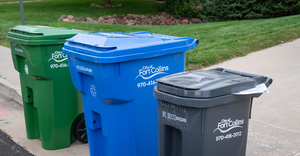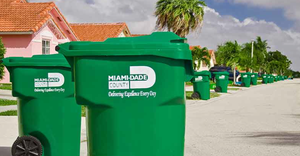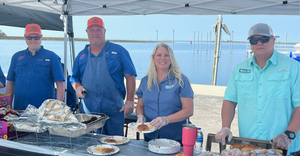Episode 122: Herman Miller’s Iconic Chair Gets an Ocean Plastics Makeover
September 20, 2021
In this episode of NothingWasted!, we chat with Gabe Wing, director of sustainability, Herman Miller and Dune Ives, executive director, Lonely Whale. Herman Miller produces home and industrial furnishings and is known for its problem-solving designs; the company recently announced that its next generation of Aeron chairs will be manufactured using discarded plastic bottles and fishing nets culled from coastal cities in India and Indonesia. Lonely Whale is an award-winning incubator for driving meaningful change on behalf of the ocean.
We spoke with Gabe and Dune about the power of collaboration, ocean-bound plastics as a platform for innovation, the social impacts that can be made through sourcing ocean-bound plastics and more.
Here’s a sneak peek into the discussion:
Waste360: Gabe, it seems like Herman Miller has been on a sustainability journey since the ‘50s. Can you give us a top-level highlight of that journey?
Wing: At Herman Miller, I think our passion for sustainability can be traced back to our founder, D.J. DePree. D.J. very much created an organization that was values-driven, and that runs through everything that we do: this belief that we have an obligation to be a good steward of the earth’s resources. And the way that value has manifested itself has changed as we’ve learned more. It’s also the reason we’re connected with the organization NextWave Plastics.
Waste360: Dune, you are a leader in the NextWave Plastics consortium, which is a network of brands developing the first global network of ocean-bound plastic supply chains. Can you tell us more about that?
Ives: At Lonely Whale, we helped launch NextWave Plastics in 2017, and Herman Miller was one of our founding corporate members — so we’ve been on this journey together. I’m happy to say we are on track with meeting our 2025 goals, and I have learned so much from the members—about both the process to source a new material as well as the process and timeline it takes to integrate something new into a product. And this new announcement from Gabe and team is one of the most exciting things we’ve seen come out of NextWave Plastics. The progress Herman Miller has made gives me all the confidence in the world that we will not only hit, but likely exceed, our 2025 goal of integrating a minimum of 25,000 metric tons of ocean-bound plastics into products that will never make their way back into the ocean.
Waste360: How did the pandemic affect your supply chains?
Ives: We fully expected that the ocean-bound plastics supply chain would experience slowdowns. What we didn’t expect was how much more committed the NextWave member companies would become—and how much more of a resolve they would have in their commitment to sourcing this material and to really care for the communities where this material is coming from. …During the pandemic, we’ve been evolving our thinking, so there’s a lot of action, activity, incredible strategic thinking, and collaboration that has taken place over the last year and a half. We’re in such a strong position.
Waste360: Gabe, in addition to using ocean-bound plastics in the Aeron chair, I know your company is also using it in returnable shipping crates for the chairs and parts. That’s so exciting, and your team has really thought about this from end to end.
Wing: I think it’s just a testament to the team at Herman Miller, whether it’s the supply management team or packaging team taking this platform and asking how we can extend it across our entire operation. Reusable shipping containers aren’t particularly sexy, but we use them day in and day out. So we worked with our suppliers to see how much ocean-bound plastics we could put it those containers so they still perform the way they need to. And, along those same lines, working with our plastic bag supplier to start incorporating ocean-bound plastics into an imperfect product and making those incremental changes.
#NothingWastedPodcast
You May Also Like


